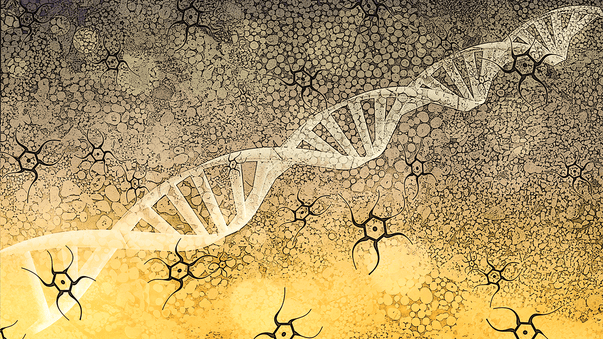B Vitamins for DNA Methylation to Decrease Epigenetic Age

The release of information about astronaut Scott Kelley’s epigenetic changes during space flight has spurred some interesting conversations. The epigenome is a collection of factors that affect the way genes are used. Methyl groups attached to DNA are one type of epigenetic factor. After Scott Kelley had been in space for 9 months, he had a significant drop in the number of methyl groups attached to his DNA. At the end of his one year mission in space, the number of methyl groups had recovered but the placement of the methyl groups had changed, especially on genes that are involved with oxygen deprivation, DNA repair, and bone formation. During his first 6 months back on Earth the methylation pattern of Scott’s DNA changed to more closely resemble his methylation pattern pre-space flight.
The human body responds to its environment by making changes to the epigenome. The essential vitamins folate, vitamin B6, and vitamin B12, and other compounds made in the body, such as choline, betaine, and methionine, contribute to the production of a compound called SAMe. SAMe is responsible for providing the methyl group for DNA methylation. Some types of flavanols inhibit the methylating enzyme. As humans age, the methylation pattern of cell DNA changes, some areas become more methylated, while others become less methylated. The pattern change may contribute to the changes seen with aging.
A person’s methylation pattern can be compared to a clock. When certain patterns of methylation emerge, it can be said that they are epigenetically “older” or their DNA methylation is aging. This first study used the Horvath epigenetic clock model. The Horvath model looks at the methylation of 353 CPG sites, which tend not to be methylated, and are associated with cell survival and development.
B Vitamins may decrease epigenetic age. Dietary Intervention Modifies DNA Methylation Age Assessed by the Epigenetic Clock. This study used data from 44 participants in a study of folic acid (vitamin B9) and vitamin B12 supplementation, and data from 13 participants in a study of monomeric andoligomeric flavanol supplementation. Both studies had taken DNA samples before and after supplementation. The researchers took the data and analyzed it looking at the changes in methylation patterns. After 2 years of supplementation with 400 micrograms folic acid and 500 micrograms B12, CPG sites had increased methylation in people with the MTHFR677CC genotype, which is especially common in women. The MTHFR677TT genotype has a less active enzyme in the pathway that takes a methyl group from folate and makes it available to methylate DNA. The researchers speculated that men may need more folate to see benefits because of their greater body mass. After 8 weeks of supplementation with 200 mg monomeric andoligomeric flavanols, areas with high methylation had decreased methylation. The folic acid and vitamin B12 supplementation appears to have positively influenced the epigenetic pattern in participants.
Alpha Lipoic Acid may support cardiovascular function. Effect of Alpha-Lipoic Acid Supplementation on Endothelial Function and Cardiovascular Risk Factors in Overweight/Obese Youths: A Double-Blind, Placebo-Controlled Randomized Trial. This study included 67 overweight children ages 8-16 and 22 normal weight controls. The overweight children were randomly assigned to a placebo or 800 mg/day of Alpha-LIpoic Acid (ALA) for three months. Being overweight is associated with inflammation, reduced artery diameter, atherosclerosis, and other cardiovascular disease risk factors. ALA is known for being anti-inflammatory. After three months, the group of participants who had taken the ALA supplement saw improvement in basal and peak arterial diameters, reaching values observed in the group of normal-weight healthy subjects.
Caffeine may help burn fat during exercise. Effects of p-Synephrine and Caffeine Ingestion on Substrate Oxidation during Exercise. This study involved 13 people who were willing to perform a cycling test 4 times: once with placebo, once with caffeine, once with p-Synephrine, and once with p-Synephrine and Caffeine. Here I will focus on the caffeine trial. The researchers found that caffeine did not alter the total energy expenditure or heart rate during the exercise test. It did, however, increase the maximal rate of fat oxidation during exercise when compared with the placebo. After caffeine ingestion, the participants were using fat as a fuel longer, rather than using carbohydrate or lactate.
More Articles
Don't fall behind! Thrivous monitors new human studies of nootropic and geroprotector supplements, so you can make the best decisions based on the latest science. Supplement Science Updates are part of the free Thrivous newsletter. Subscribe now to receive email about human enhancement, nootropics, and geroprotectors, as well as company news and deals.
Read more articles at Thrivous, the human enhancement company. You can browse recent articles in Thrivous Views. See other Supplement Science Update articles. Or check out an article below.
-
Melatonin Shows Promise as Anti-Aging Supplement
A 2006 paper by researchers at the N.N. Petrov Research Institute of Oncology in St. Petersburg, Russia,[1] reviewed the scientific ...
-
Epigenetic Expression of DNA Affects Aging and Longevity
The sequence of our DNA influences how our bodies work and who we are but generally remains unchanged. From early ...


